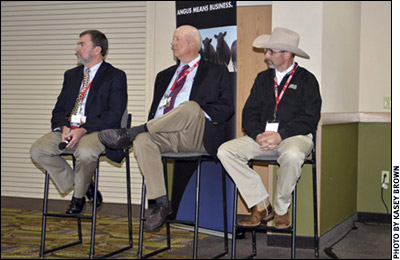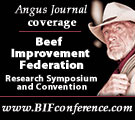Practical Tips on Succession Planning
Business workshops at Angus Means Business National Convention & Trade Show share estate-planning strategies.
Succession planning is certainly not easy, but open communication will make it easier. Dave Specht, certified financial planner and owner of Advising Generations LLC, gave some tips on making the transition smoother during the business block workshops at the Angus Means Business National Convention & Trade Show in Kansas City, Mo., Nov. 4-6, 2014.

The panel on succession planning consisted of (from left) Paul Neiffer, CliftonLarsonAllen LLP; Joe Mayer, Mayer Ranch; and Don Schiefelbein, Schiefelbein Farms.
He shared seven themes that help measure perceptions and manage expectations for all involved in an estate transfer.
- Theme 1: Business/estate planning — “The best succession plan is not the one that minimizes the most taxes; the best is one that minimizes the most surprises,” Specht said. There should be a coordinated effort between the professionals on your team — banker, certified public accountant (CPA), insurance professional, investment advisor. Is the plan documented and does it take into consideration the perspectives of all generations? Estate plans should not be made in secret.
- Theme 2: Communication — All family members should be able to discuss what the farm means to them without creating conflict. Sometimes an independent mediator can help facilitate discussion, he said. Do all generations have a voice in strategic decisions for the ranch?
- Theme 3: Leadership development — Is there an entrance strategy for the next generation of family members who want to come back to the farm or ranch? He recommended letting the younger generation make as many decisions as possible while the older generation is still around to help if mistakes are made. Don’t let the first decisions they make be ones that could break the farm or ranch. Is the next generation willing to share in the risk of the ranch, and do they know the market value of the job they perform?
- Theme 4: Trust — Do both generations want to see the ranch stay in the family through the next generations? Financial capabilities and stewardship decisions are also issues that should be discussed before the transfer so there is mutual trust in the operation of the ranch, he said.
- Theme 5: Personal resilience — Farming and ranching is tough work, and knowing the attitude of all involved in difficult times is important. Do all generations have the ability to learn from struggles?
- Theme 6: Retirement/Investment planning — When will the older generation retire? How will they be financially stable, and from where will the cash flow come?
- Theme 7: Key non-family employees — How do they fit into the ranch’s vision in the generation transfer? Does the new generation have a good working relationship with key non-family employees? Are there financial incentives for them to stay after the senior generation transitions out?
More questions to get succession-planning discussion rolling can be found at www.inspired-questions.com, he concluded.
Speaking from experience
"It depends” is a common answer when asking questions about estate planning. However, there are some ideas that can help decipher the cryptic advice. Moderated by Specht, a panel of estate-planning veterans and advisors consisting of Paul Neiffer, agribusiness CPA at CliftonLarsonAllen LLP; Joe Mayer of Mayer Ranch, Guymon, Okla.; and Don Schiefelbein of Schiefelbein Farms, Kimball, Minn., shared their expertise with workshop participants.
Starting is a hard aspect of the transition, but all panelists agreed that starting sooner is better than later. Without forward planning, a rancher might have to make out a large check to the IRS, explained Mayer. “We couldn’t afford to get into that situation.”
Schiefelbein emphasized that it is not someone else’s responsibility to get the process started. A health scare caused him to start the process with his family, and he recommended starting the process because you never know what will happen.
How do you start? The panelists agreed that it is necessary to decide what you want out of your estate plan before you begin compiling your team of professionals to execute it. Figure out the ultimate goal of your estate plan, whether it is to minimize tax risk or to transfer the ranch into the shared ownership of siblings. Once the ultimate goal is established, Neiffer explained, your estate lawyers and accountants can help figure out the best path to that goal.
When a family’s No. 1 reason for estate planning is to eliminate taxes, the ranch usually sells fairly soon, Neiffer shared of his experience. “However, when the No. 1 reason is to continue the ranch for the family, those stick around and we can help them on a tax plan. We need you to lead off with what you want.”
He added that while most starting an estate plan have a Type A personality and want to get things done quickly and efficiently, so are most of the advisors. With that many leader-type personalities, it is important to have a team lead and open communication between all team members.
Mayer added that it is common for ranchers to be secretive of what they own because they don’t want the county tax assessor to find out, but without collaboration from everyone on the team, it can be a disaster.
The panel spoke during the business workshop Tuesday afternoon, Nov. 4. For more information about the Angus Means Business National Convention & Trade Show and to listen to the presentations, visit www.angusconvention.com.






